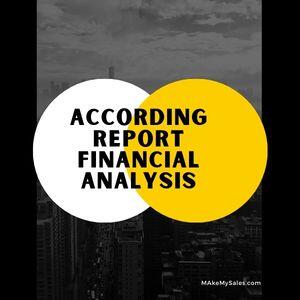Accounting Report Financial Analysis
Balance Sheet, Income Statement, CFS, Notes and Annexes
Importance of Accurate Financial Statements for a Business
Financial statements provide various financial information that investors and creditors use to evaluate a company’s financial performance.
For any business and for the people who run it, the importance of accurate financial statements cannot be underestimated. Some of the most important financial statements that are imperative for an organization of any scale are: Income Statement, Balance Sheet, Statement of Stockholders’ Equity, Cash Flow Statement and Statement of Comprehensive Income. The numbers revealed through these financial statements play an immense role in making decisions, planning strategies, determining success, estimating failures, and telling the world the story of the company.
Importance of Accurate Financial Statements for Organizations
-
Financial Transparency:
Even the smallest numbers in a balance sheet can have a huge impact on the business. Assets never have the same value that they did when they were first purchased. A percentage has to be deducted from their value for depreciation. A company might report a certain number as revenue earned. But how much of it is actual cash and how much of it is accounts receivable has to be accurately stated. Numbers like Profit before Tax, Profit after Tax, and Profit after Interest, Depreciation and Tax are all important numbers that tell shareholders and management a lot.
-
Evaluate Tax Liability:
Corporate tax rates are quite high. When companies make a lot of profit, the taxes they have to pay are equally high. The owners often get astonished at how little they have left once they have paid taxes to the government. Can they reduce their tax burden? If yes, then they will need the most accurate financial numbers possible. Otherwise, all their resources could be depleted in a very short time. Conversely, for the government, accurate financial statements are essential because many firms fudge their reports only to avoid paying tax.
-
Mitigate Errors:
Accurate financial statements are also essential to catch costly mistakes or internal wrongdoing early on in the process. If any illegal activity is taking place, there is no better way to catch it than through discrepancies in the numbers. If an error has been made, reconciliation activities can find them. That is why companies spend a lot of time on reconciling their books of accounts and checking each entry so that they can find if anyone has tampered with any part of the business or an accounting error has been made.
Investment banking especially has been prone to many accounting misdeeds over the years to cover huge trading losses. The inefficiency of the financial reporting systems allowed those losses to be hidden. That is why regulators have started asking banks and other trading firms to pay more attention to their internal accounting methods.
-
Build Trust:
More than anything else, accurate financial statements induce trust in the company. Investors need a sign that a company is doing well and they can put their hard earned money in its business. It is all very well if the balance sheet shows a profit. But there have been times when the balance sheet of many companies showed a profit, only to be found later that they were actually hiding losses. Large-scale companies like Enron and WorldCom and successful accounting firms like Arthur Andersen had to be closed because of their role in fudging financial statements. After experiences like that, it is little wonder then that the world is more concerned about accurate financial statements than ever before. Governments have made accounting and compliance rules more stringent, so that companies do not feel tempted to misreport their financial numbers.
-
Improved Payment Cycles:
In order to optimize the Accounts Payable and Accounts Receivable cycles, accuracy of financial statements plays a key role. Other outgoing payments include salaries and daily wages that need to be paid (payroll), dividends need to be given to the shareholders, inventory needs to be managed, and creditors need to be paid. All this cannot be done unless the numbers are in order. If a loan is overdue then the company needs to know how much interest has to be paid or received. Mathematical calculations can only be done with the correct figures.
-
Better Decision Making, Planning and Forecasting:
Analysing financial statements is crucial when decisions are to be made. A finance manager would look at the value of the assets that he currently holds and decide if he can afford to purchase more. When the value of assets is severely depreciated, questions would arise if they need to be sold off.
A company needs more funds to expand its business; the accountant would look at the debts on the balance sheet, the shareholders capital, and other loans they have taken and decide which type of financing they can afford. When the time comes for the company to pay dividend, the CFO would look at the profits that have been made, the debts that need to be paid off, the provisions made for various reserves and decide what the quantum of dividend can be.
Financial statements open a window for educated decision-making and strategic planning. The working capital statements, fund flow statements, cash flow statements, and trading account all have to be consulted every day for evaluating how much money the company is making, how much money they need, the reserves that they need to set aside, and how they propose to increase sales and boost financing.
The above-mentioned points emphasize why it is imperative that companies strive to maintain the accuracy of their financial statements. Following GAAP or other applicable accounting standards to generate these statements is a critical factor in ensuring they present the actual financial picture of the business to management and external stakeholders.







Priya Srinivasan –
Best Accounting Report Financial Analysis
Amith –
Best Accounting Report Financial Analysis